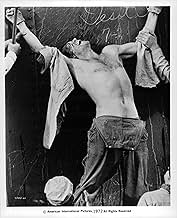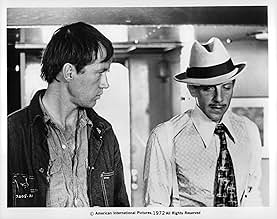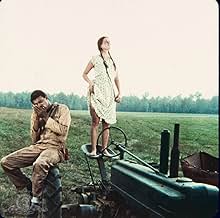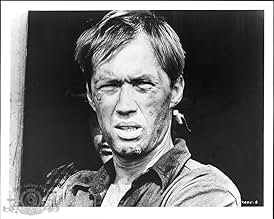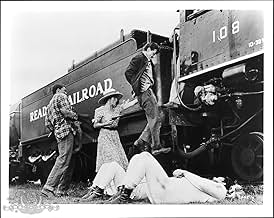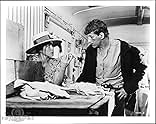During the Great Depression, a union leader and a young woman become criminals to exact revenge on the management of a railroad.During the Great Depression, a union leader and a young woman become criminals to exact revenge on the management of a railroad.During the Great Depression, a union leader and a young woman become criminals to exact revenge on the management of a railroad.
- Director
- Writers
- Stars
- Awards
- 1 nomination total
David Osterhout
- McIver #2
- (as David R. Osterhout)
Grahame Pratt
- Emeric Pressburger
- (credit only)
'Chicken' Holleman
- M. Powell
- (credit only)
Harry Northup
- Harvey Hall
- (as Harry Northrup)
Jerry Cortez
- Sheriff
- (uncredited)
Louie Elias
- Boxcar Tough
- (uncredited)
Michael Fitzgerald
- Apple Peeler
- (uncredited)
Gerald Raines
- Train Engineer
- (uncredited)
Gayne Rescher
- Brothel Client
- (uncredited)
- Director
- Writers
- All cast & crew
- Production, box office & more at IMDbPro
Featured reviews
Roger Corman's indirect influence on the 70s movie renaissance is often overlooked. Many of that decade's key players served their apprenticeships on Corman's quickies. Directors like Coppola, Bogdanovich, Bartel and Demme, and actors like Nicholson, Hopper, Fonda, Dern, Stanton, and even De Niro.
Add Martin Scorsese to that list. 'Boxcar Bertha', his movie directly before the breakthrough 'Mean Streets', may not display his talent in full, but it is a surprisingly well shot and acted, and is an above average b-grade movie with a lot of entertainment value.
Like similar Corman productions from this period ('Bloody Mama', 'Dillinger', 'Big Bad Mama') it is a Depression era look at flamboyant criminals. An exploitation movie for sure, but exploitation with style and class. Barbara Hershey (who would reunite with Scorsese in seriously underrated 'The Last Temptation Of Christ') plays the title role, but the real star of the movie is her then real life partner David Carradine ('Kung Fu', 'Death Race 2000'), who gives a strong, charismatic performance. The supporting cast includes blaxploitation legend Bernie Casey ('Cleopatra Jones',etc.), Carradine's veteran character actor father John, and Scorsese/Ferrara regular Victor Argo ('Taxi Driver', 'King Of New York').
'Boxcar Bertha' is by no means one of Scorsese's greatest achievements, but it is nothing to be embarrassed about either. Check it out sometime. It's much better than you would think.
Add Martin Scorsese to that list. 'Boxcar Bertha', his movie directly before the breakthrough 'Mean Streets', may not display his talent in full, but it is a surprisingly well shot and acted, and is an above average b-grade movie with a lot of entertainment value.
Like similar Corman productions from this period ('Bloody Mama', 'Dillinger', 'Big Bad Mama') it is a Depression era look at flamboyant criminals. An exploitation movie for sure, but exploitation with style and class. Barbara Hershey (who would reunite with Scorsese in seriously underrated 'The Last Temptation Of Christ') plays the title role, but the real star of the movie is her then real life partner David Carradine ('Kung Fu', 'Death Race 2000'), who gives a strong, charismatic performance. The supporting cast includes blaxploitation legend Bernie Casey ('Cleopatra Jones',etc.), Carradine's veteran character actor father John, and Scorsese/Ferrara regular Victor Argo ('Taxi Driver', 'King Of New York').
'Boxcar Bertha' is by no means one of Scorsese's greatest achievements, but it is nothing to be embarrassed about either. Check it out sometime. It's much better than you would think.
Martin Scorsese got hired by Roger Corman, I presume, to make this "based on true story" movie of a boxcar thief and robber named Bertha whom with some other robbers stole their way into a small piece in history but got into strife towards the end. It isn't one of his best pictures since he really was just the director and the script and the actors did more work than he needed to do on the picture. Like The Color of Money, it's a film that if he didn't direct it it wouldn't of made much of a difference in the outcome.
Still, give credit where credit is due, and those (very few I might think) that heard what Cassavettes said to Scoresese after the movie got released (he told Marty that it was a piece of s*** and to work on something better- which he did with Mean Streets) should disregard it. Overall, Boxcar Bertha is a watchable and good piece of cinema with some decent performances and an overall feel that works in it's "tradition of Bonnie & Clyde" genre. Hershey and Carradine are also good. Just don't expect anything ground-breaking, unlike the next 5 out of 6 movies Scorsese would make in the next eight years after this. B+
Still, give credit where credit is due, and those (very few I might think) that heard what Cassavettes said to Scoresese after the movie got released (he told Marty that it was a piece of s*** and to work on something better- which he did with Mean Streets) should disregard it. Overall, Boxcar Bertha is a watchable and good piece of cinema with some decent performances and an overall feel that works in it's "tradition of Bonnie & Clyde" genre. Hershey and Carradine are also good. Just don't expect anything ground-breaking, unlike the next 5 out of 6 movies Scorsese would make in the next eight years after this. B+
Director Martin Scorsese stages some beautifully choreographed violence in "Boxcar Bertha", his first studio film, but he had yet to break through to his actors, and much of the picture is stilted or awkward. Barbara Hershey plays Bertha Thompson, a teenage orphan in Depression-scarred Arkansas who falls in league (and in love) with a union organizer; they're joined by a black harmonica player and a Yankee card-shark to take revenge on the railroad company by robbing the trains. Adapted from Ben L. Reitman's book "Sister of the Road", Scorsese as a filmmaker is a bit misplaced within this milieu--the 1930s doesn't seem to be his thing--and while the film has atmosphere, it lacks visual assurance and nuance. Similarly, Hershey doesn't seem to connect with the Depression, either; with her dreamy eyes, flowing chestnut hair and penchant for throwing her lines away blithely, she's more like a Boxcar Hippie. Still, Scorsese uses her well at certain moments, particularly early on when she's shooting craps around a campfire, correcting a friend about her surname, or staring out a rain-soaked window. She also looks great chasing after locomotives, and the train sequences are all well-filmed. The finale, a slaughter out in the middle of nowhere, packs a visual wallop. It seems certain the youthful director saved his creative juices for this sequence, and his cinematic prowess suddenly flairs up. Visceral and expressive, this showdown turns the story around from mere exploits of low-class gangsters into something far more profound: a sorrowful human tragedy soaked in consequence and fate. **1/2 from ****
This was Martin Scorsese's second full-length feature film and it is a decent one. It's about a young girl in the 1930's who meets and falls in love with a union organizer, who also happens to be a thief. Together, they form a small gang and begin robbing trains as well as anything else they can get their hands on. The fun soon turns to fright when they become fugitives and are hunted down by law enforcement officers. There's action and entertainment but not a movie that you would expect from Martin Scorsese. It has none of his trade marks whatsoever. But do realize that this was one of his first films and try to respect that. I do.
Scorsese refers to this 1972 Roger Corman quickie--he shot it in the deep South in twenty-one days--as his "exploitation picture." Funny, that--if it came out today, it'd be the height of the Arty Independent Film. Barbara Hershey and David Carradine are this movie's knockoff of Bonnie and Clyde; the script ain't much, but Scorsese storyboarded every shot and hoo doggie! This guy was the greatest shotmaker ever, even when he was on Skid Row. Rent it for Hershey's lyrical style and the chance to discern the fetus of a genius.
What Scorsese Film Ranks Highest on IMDb?
What Scorsese Film Ranks Highest on IMDb?
Cinema legend Martin Scorsese has directed some of the most acclaimed films of all time. See how IMDb users rank all of his feature films as director.
Did you know
- TriviaAfter he finished this film, Martin Scorsese screened it for John Cassavetes. Cassavetes, after seeing it, hugged Scorsese and said, "Marty, you've just spent a whole year of your life making a piece of shit. It's a good picture, but you're better than the people who make this kind of movie. Don't get hooked into the exploitation market, just try and do something different." Scorsese's next film was Mean Streets (1973).
- GoofsThe currency shown in the film is all modern, post 1960s, with modern banking money bands.
- Quotes
Boxcar Bertha: Pay no attention to that man behind the curtain.
- Crazy creditsOpening Statement: The following events are adapted from the true experiences of Boxcar Bertha Thompson, as related in the book "Sister of the Road"
- Alternate versionsThe restored 2020 version added a 12 seconds shot introducing the party around the 58th minute.
- ConnectionsFeatured in The Directors: The Films of Roger Corman (1999)
- How long is Boxcar Bertha?Powered by Alexa
Details
Box office
- Budget
- $600,000 (estimated)
- Gross worldwide
- $6,443
- Runtime1 hour 28 minutes
- Color
- Aspect ratio
- 1.85 : 1
Contribute to this page
Suggest an edit or add missing content




